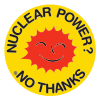
| Anti-nuclear movement |
|---|
 |
| By country |
| Lists |
In the 1970s, an anti-nuclear movement in France, consisting of citizens' groups and political action committees, emerged. Between 1975 and 1977, some 175,000 people protested against nuclear power in ten demonstrations.[1]
In 1972, the anti-nuclear weapons movement maintained a presence in the Pacific, largely in response to French nuclear testing there. Activists, including David McTaggart from Greenpeace, defied the French government by sailing small vessels into the test zone and interrupting the testing program.[2][3] In Australia, scientists issued statements demanding an end to the tests; unions refused to load French ships, service French planes, or carry French mail; and consumers boycotted French products.[3] In 1985 the Greenpeace ship Rainbow Warrior was bombed and sunk by the French DGSE in Auckland, New Zealand, as it prepared for another protest of nuclear testing in French military zones. One crew member, Fernando Pereira of Portugal, photographer, drowned on the sinking ship.
In January 2004, up to 15,000 anti-nuclear protesters marched in Paris against a new generation of nuclear reactors, the European Pressurised Reactor (EPR).[4] On March 17, 2007, simultaneous protests, organised by Sortir du nucléaire, were staged in 5 French towns to protest construction of EPR plants.[5][6]
After Japan's 2011 Fukushima nuclear disaster, thousands staged anti-nuclear protests around France, demanding reactors be closed. Protesters' demands were focused on getting France to shut its oldest nuclear power station at Fessenheim. Many people also protested at the Cattenom Nuclear Power Plant, France's second most powerful.[7] In November 2011, thousands of anti-nuclear protesters delayed a train carrying radioactive waste from France to Germany. Many clashes and obstructions made the journey the slowest one since the annual shipments of radioactive waste began in 1995.[8] Also in November 2011, a French court fined nuclear power company Électricité de France €1.5m and jailed two senior employees for spying on Greenpeace, including hacking into Greenpeace's computer systems.[9] The sentence was overturned by an appeals court in February 2013.[10]
In March 2014, police arrested 57 Greenpeace protesters who used a truck to break through security barriers and enter the Fessenheim nuclear power plant in eastern France. The activists hung antinuclear banners, but France's nuclear safety authority said that the plant's security had not been compromised. President Hollande has promised to close Fessenheim by 2016, but Greenpeace wants immediate closure.[11]
- ^ Herbert P. Kitschelt. Political Opportunity and Political Protest: Anti-Nuclear Movements in Four Democracies British Journal of Political Science, Vol. 16, 1984, p. 71.
- ^ Paul Lewis. David McTaggart, a Builder of Greenpeace, Dies at 69 The New York Times, March 24, 2001.
- ^ a b Lawrence S. Wittner. Nuclear Disarmament Activism in Asia and the Pacific, 1971-1996 The Asia-Pacific Journal, Vol. 25-5-09, June 22, 2009.
- ^ Thousands march in Paris anti-nuclear protest ABC News, January 18, 2004.
- ^ "French protests over EPR". Nuclear Engineering International. 2007-04-03. Archived from the original on 2007-09-27. Retrieved 2007-04-10.
- ^ "France hit by anti-nuclear protests". Evening Echo. 2007-04-03. Archived from the original on 2007-09-29. Retrieved 2007-04-10.
- ^ Cite error: The named reference
afp11was invoked but never defined (see the help page). - ^ "Thousands of Protesters Obstruct Nuclear Waste Transport". Spiegel Online. 2011-11-28.
- ^ Richard Black (10 November 2011). "EDF fined for spying on Greenpeace nuclear campaign". BBC. Retrieved 11 November 2011.
- ^ "French court throws out EDF guilty verdict in hacking case". Reuters. 6 February 2013. Retrieved 4 January 2013.
- ^ "France: Greenpeace Activists Arrested in Break-In". New York Times. March 18, 2014.